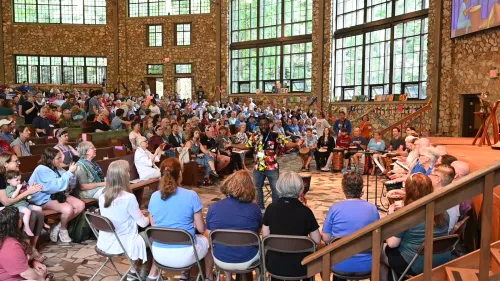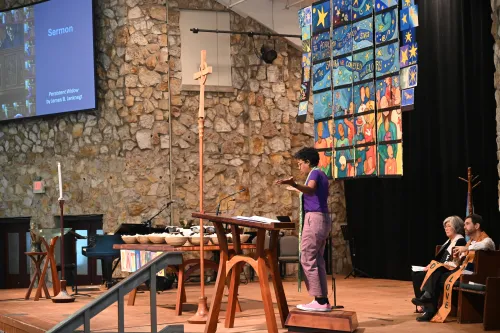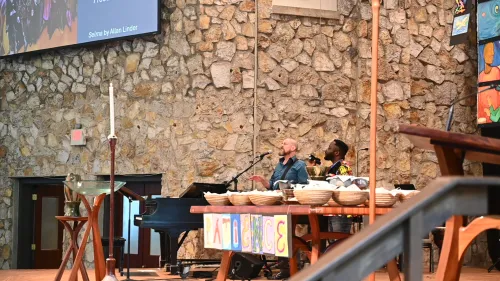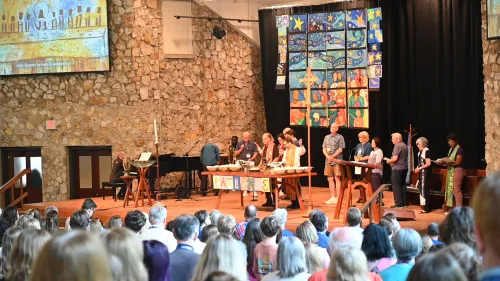Persistence and patience
The Worship & Music Conference’s concluding service hits all the right notes
MONTREAT, North Carolina — It seemed a paradox to use the Parable of the Widow and the Unjust Judge, a story about persistence, as a preaching text for Friday’s theme of patience during the final day of the first week of the Presbyterian Association of Musicians’ Worship & Music Conference. But the conference preacher, Dr. Margaret Aymer, weaved ideas about patience and persistence to show the 650 or so in worship what it means to be a faithful disciple.

Led by Daniel Otu, members of the African drumming class got worship started with “Praise God, All You Nations” and a rousing “We Are Marching.”
Aymer, Vice President of Academic Affairs at Austin Presbyterian Theological Seminary, capped a week of stellar preaching, first placing Jesus’ parable in its context. “The community has been living under the oppressive thumb of Roman imperialism,” she said. In the previous chapter, Luke records Jesus’ promise that the day of the Lord will come, when “the righteous will be saved and all will be made new. But that time has not yet come — not for the disciples, and not for us,” Aymer said. And so, to encourage his disciples to persist, Jesus tells them the story of the widow and the judge.

The judge finally relents, “not because he thinks her cause is right, but because he knows she will keep coming until she wears him down,” Aymer said. “We all know women like that,” and those gathered for worship cheered.
“Friends, I truly think that Jesus means to underscore to us that in all our persistence, God will be patient with us. Persistent prayer can be seen as impertinent,” Aymer said. “God knows our persistence serves a purpose.”
“We become what we do. You know that as musicians, as artists, as Christians,” Aymer said. Difficult music “may be hard to play at first, but after hours of persistent practice, we find ourselves playing accurately, and then, miraculously, musically.”
It’s the same with prayer, worship “and being attentive to Scripture. That persistence shapes us,” she said, and our persistence teaches us patience. “Patience and persistence are the work of faith.” Like warp and weft in fabric weaving, weavers construct layer on layer, until at last they form a garment that warms us and strengthens us for the journey ahead.”
As we pray, “we become shaped to be like the one to whom we pray,” Aymer said, and the patience we learn “becomes the patience we show our family and friends, our neighbors and those who are strange to us.”

It also becomes “the patience we show our church. With persistence, our ancestors have fought for the inclusion of all God’s children. That persistence has been accompanied by patience, the patience to stay with a community that tells them no, until we become what we do, until we are all changed more fully into the image of God.”
On a drum, David LaMotte led those gathered in “Ain’t Gonna Let Nobody Turn Me Around,” a traditional civil rights freedom song. The Rev. Dr. Felipe Martínez and the Rev. Dr. David Gambrell served as communion co-celebrants.

After that, the Children’s Choir delivered a lovely version of “Come, Let Us Worship God,” written by Ray Makeever and arranged by Katie Houts.
The sending hymn was epic: “Love Divine, All Loves Excelling,” sung to HYFRYDOL and accompanied by organ, kettle drums, trombones and trumpets. The third verse sung a cappella in four-part harmony was especially lovely.
Conference organist Dr. Tom Trenney gloriously improvised HYFRYDOL for the postlude.
Week 2 of the Worship & Music Conference continues this week.
You may freely reuse and distribute this article in its entirety for non-commercial purposes in any medium. Please include author attribution, photography credits, and a link to the original article. This work is licensed under a Creative Commons Attribution-NonCommercial-NoDeratives 4.0 International License.




